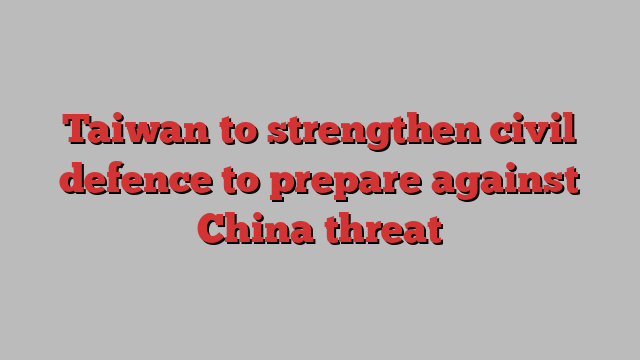
Unlock the Editor’s Digest for free
Roula Khalaf, Editor of the FT, selects her favourite stories in this weekly newsletter.
Taiwan’s government is working to prepare public services and infrastructure to function in wartime as China’s increasingly aggressive stance fuels concerns about the risk of open conflict.
The reform agenda includes proposals to boost civil defence manpower, build up food and energy stockpiles and emergency medical capacity and strengthen communication infrastructure, according to several government officials familiar with the discussions.
The plans are set to be submitted for approval on Thursday to President Lai Ching-te, who has made improving civil defences a priority since he took office in May.
“In a nutshell, if there is a war in Taiwan, our military will have to fight, but we want society to be able to survive and function as normally as possible,” said a senior administration official.
China claims Taiwan as part of its territory and threatens to subjugate it with military force if Taipei refuses to submit to Beijing’s control indefinitely. Chinese leader Xi Jinping has in recent years replaced his predecessor’s more patient approach with a campaign of political, economic and military pressure aimed at coercing Taiwan.
Taipei’s civil defence plans build on the work of Lai’s predecessor Tsai Ing-wen. Jolted into action by Russia’s full-scale invasion of Ukraine in 2022, her government stepped up defence reform, including reinstating one-year conscription for men, and started assessing the country’s resilience. However experts warn that Taiwan remains woefully underprepared for war.
One proposal would earmark school halls as shelters if people living nearby are made homeless in an attack. Officials also plan to expand rice milling capacity, increase stockpiles of food staples and drill more wells to ensure water supplies.
They are also exploring ways to implement a food rationing system. One option under consideration is to use Taiwan’s ubiquitous 24-hour convenience stores — the country has one for every 1,700 people — to distribute supplies.
Hospitals need to be equipped to treat large numbers of casualties, while officials also want to build back-up infrastructure in case undersea cables crucial to Taiwan’s communications are cut.
The government has been conducting feasibility studies for services that rely on low Earth orbit satellites, similar to Elon Musk’s Starlink, which helped to keep Ukraine online.
Despite the focus on building capacity, government officials and defence experts said a bigger challenge would be overhauling bureaucratic structures and procedures.
They said the government now realised it was a mistake to put the All-out Defense Mobilization Agency, a body set up in 2022 to oversee reservist mobilisation and civil defence tasks, under the defence ministry, giving it no authority to deliver orders to other ministries.
“War games and other assessments of Taiwan’s defence readiness have repeatedly highlighted a lack of co-ordination between different government departments and the civilian and military bureaucracy,” said a person familiar with the discussions.
Two government officials said wrangling between central and local governments over the distribution of masks and vaccines during the Covid-19 pandemic had offered lessons for wartime.
Responsibility for key disaster response and civil defence tasks is mainly under the interior ministry during peacetime but switches to the defence ministry in wartime upon an emergency order from the president.
“We are discussing revising our disaster management mechanisms in order to build a clearer command chain and have one system that can work across peacetime and wartime,” said one senior official.
This month Taiwan will practise air raid evacuation procedures as part of an annual civil defence drill. It will for the first time include text messages warning all residents of incoming missiles and advising them to seek shelter immediately.